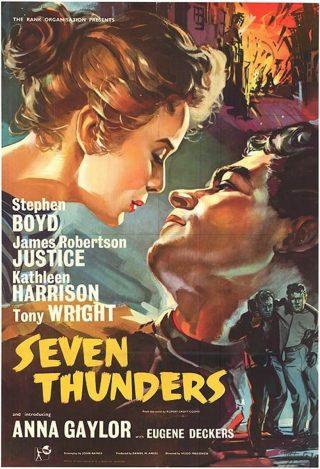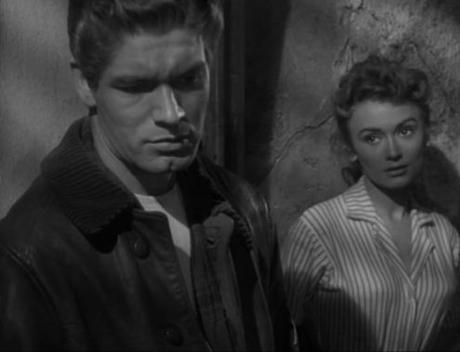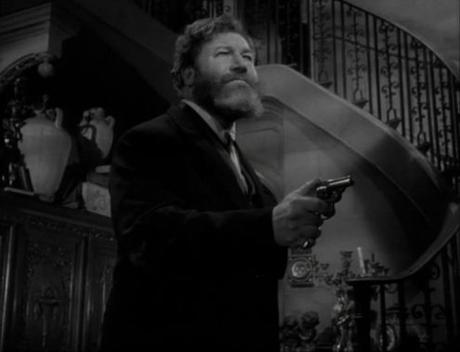
Referring to a film as a war movie probably brings to mind images of large set piece combat scenes, of pitched battles raging across the screen with intensity. Seven Thunders (1957) is a war movie and although it does feature an impressively destructive climactic set piece it is really a story (in truth a series of interlocking and interwoven tales) which is played out against, and given added urgency due to, the backdrop of war and occupation. It combines elements of a thriller, drama, and romance and ultimately ties together all the apparently disparate strands. As such, like all genre pictures, it is able to draw in and blend that which one might more readily associate with a different genre. That said, it perhaps tries to cast its net too far and too wide.
And speaking of casting nets, the opening scene by the dockside in the port of Marseille during the Nazi occupation sees a fishing vessel deposit its latest catch. Along with the bounty yielded by the Mediterranean is a pair of escaped Allied prisoners of war on the latest leg of their journey, having escaped from prison camps in Italy. Dave (Stephen Boyd) and Jim (Tony Wright) are taken to a safe house, somewhere to lie low till they can be shunted further along the line. The principal narrative thread is the experience of these two men, with particular focus on Dave and the street smart young French girl (Anna Gaylor) he finds himself reluctantly falling in love with. Running parallel to this is the matter of Doctor Martout (James Robertson Justice), on the surface a man who is dedicated to aiding the flight of large numbers of refugees and otherwise doomed individuals, but in reality a cold and utterly ruthless serial murderer. Eventually, these two plot strands converge as the relentless Nazi pressure contrives to force the increasingly restless Jim to seek an alternative means of exiting a neighborhood that is soon to be razed to the ground. As these plotlines creep toward their dramatic confluence, other characters and tales spin out of and around them, adding more layers of both tragedy and comedy. There is the impoverished intermediary (Eugene Deckers) who unwittingly sends victims to the psychopathic Martout and then finds his own life touched by an unspeakable loss. There is the young Wehrmacht soldier whose lack of lack of judgement, self-confidence and self-control brings about that loss. There is then the Englishwoman (Kathleen Harrison) who provides some much needed comic relief, not least when it is discovered that breaking through her wardrobe leads not to a magical land such as C S Lewis might have imagined but instead to a bordello. So, there is no shortage of incident as events build toward an exciting and satisfying conclusion.

All told, I don't feel Seven Thunders ranks as one of Hugo Fregonese's more successful pictures, although there is much to enjoy and appreciate in it and the director does some characteristically strong work. The main story is a compelling one and Fregonese gets the most out of the burgeoning romance between Boyd and Gaylor, capturing the immediacy of wartime relationships and gaining credibility both from the performances and the Marseille locations. On the other hand, the Martout sub-plot feels largely unnecessary - it's neither poorly executed nor uninteresting, but it feels a little undeveloped in itself and also nudges the principal story aside on occasion. If it's purpose is to add extra tension to the climax, I'm not sure that is necessary. In terms of linking elements together, the Martout strand fleshes out Eugene Deckers role and that in turn affords greater significance to the shocking and tragic business involving the Wehrmacht soldier. Still, I'd have thought those aspects could have been blended in by some other means. I guess my criticism would be directed at the writing then as opposed to the direction. That writing derives from a novel by Rupert Croft-Cooke, someone whose work I'm more familiar with under his Leo Bruce pseudonym. Leo Bruce wrote some witty detective fiction and those lighter moments I mentioned involving Kathleen Harrison recall this.
Stephen Boyd was on the cusp of real stardom when Seven Thunders was made. He had recently had a memorable part in the fine thriller The Man Who Never Was and was about to get another good role in Henry King's , as well as prominent parts in some glossy melodramas in Hollywood. Overshadowing all this though would be the plum role as Messala in Wyler's Ben-Hur. He handles the action scenes very competently, including a rooftop fight with a snooping German and the final escape from the city that is collapsing around his ears. The romantic relationship with Anna Gaylor works well too, there's a sweetness to it and some chemistry between the players. Tony Wright, who had been cast in the early Hammer picture Bad Blonde / The Flanagan Boy opposite Barbara Payton and then portrayed the villain in Tiger in the Smoke, has less to do but carries it off satisfactorily. I tend to think of James Robertson Justice as primarily a comic actor, for the simple reason that those were the parts I first saw him in. However, he did plenty of dramatic work and I think there is something startlingly effective about seeing actors one associates with lighter work portraying out and out evil characters. I know I got a definite chill from seeing him calmly informing one of his victims of the fate which awaits him.

Kathleen Harrison had a long career, and a long life too, playing some wonderful eccentrics and brings both humor and believability to her turn as the woman who has made a life for herself in the French port. As the proprietress of the adjoining bordello, former dancer Katherine Kath nails the world weariness of her character and seasons it with a dash of knowing levity. In other supporting parts, Eugene Deckers has about his creased features that careworn seediness that is a close cousin to despair and, along with Rosalie Crutchley as his downtrodden wife, deals sensitively and effectively with some of the most touching and heartrending moments in the movie.
There is a UK DVD of Seven Thunders available; while the image is generally clean and attractive I'm not sure about the aspect ratio of the presentation, it may be open matte but I think it looks a little cramped at the sides in some shots. In the final analysis, I would rate this as a movie that works well for the most part despite the fact the script attempts to pack in more story than is strictly necessary.
